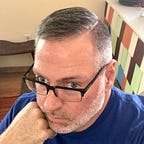We Still Need LGBT Pride!
Stop your griping and just go!
I went to my first Pride parade in L.A. in 1985 (or was it 1986?) I can’t remember. It seems such a long time ago, now…
We were deep in the throes of the AIDS crisis and mass indifference to gay suffering and death. But the ubiquitous admonition to “Wear your rubbers, boys!” seemed largely irrelevant to my hopelessly celibate self.
I felt fat, ugly, and unlovable; so uncomfortable in my own skin that I wouldn’t have even recognized seduction, much less been able to reciprocate.
I was terrified and vulnerable. Very, very vulnerable. But I was embraced by a group of perfect strangers who kindly pretended this naïve kid from Orange County wasn’t as young (or dumb!) as he looked.
They just cheered the parade and passed the whiskey. That day we were all just ‘queer as folk,’ enjoying the sunshine, some easy camaraderie, and twinks in speedos gyrating atop floats.
People like them kept my 20-year-old self from falling that day, and many days after.
Today, LGBT youth are some of the most heavily burdened sub-groups under the queer umbrella, with disproportionately high rates of homelessness, unemployment, drug addition, suicide and suicide attempts, rape and sexual assault, dating violence, bullying, and sexually transmitted infections.
Queer kids are starved for representation in pop culture and not typically born into queer families. Their only access to queer culture is through (equally uninformed) peers, the Internet, pornography, and ‘hook-up’ apps.
In their delayed queer education, Pride parades and festivals offer LGBT youth a multitude of as-yet-unimagined ways of living a useful, productive, and fully queer existence. They exhibit ways of living (and loving) that cis-het culture does not offer. And they provide precious and rare opportunities to imagine and debut nascent queer identities, with little risk of backlash or criticism.
They also provide spaces for queer youth to forge what lesbian anthropologist Kath Weston famously called “families we choose” — the kind of family that carries us through, when our relatives can’t (or won’t….)
That’s no small thing in the life of LGBTQ youth.
Amid arguments over the colors on the rainbow flag, the letters in the community acronym, the role of the police and corporate sponsorship, we cannot forget that, for some vulnerable kid from the suburbs or the countryside, Pride can be an eye-opening, even life-saving, experience.
Whatever our differences, we urgently need to preserve Pride for kids like me who drive into The Big City for their first Pride, have their eyes opened to life’s queer possibilities, and get wrapped in the arms of a loving crowd that will keep them from falling until they’re strong enough to walk on their own.
We need to hold space for them until they can claim for themselves the right to occupy public space as their full, authentic selves—a right we cannot take for granted in the ‘time of Trump.’
If you’re near a town or city holding a Pride parade or festival — usually the last weekend of June — please attend! Give a few bucks, catch a few beads, drink some beers, and eat some BBQ. Wear your pink tutu, sprinkle some glitter, flap your angel wings, flounce your rainbow wig, and sissy that walk!
If you’re lucky, Dykes on Bikes will roar by!!!
If you liked this story, please share it on Twitter or Facebook! It means the world to writers to know their work’s being read!
Michael J. Murphy, PhD, is Associate Professor of Gender & Sexuality Studies at the University of Illinois Springfield. He is the author of many book chapters, and encyclopedia and journal articles. Most recently, he edited Living Out Loud: An Introduction to LGBTQ History, Society, and Culture (New York: Routledge, 2019). He tweets @emjaymurphee.
An earlier version of this story was published on June 21, 2017 at www.boom.lgbt. It has been revised and updated for publication here.
